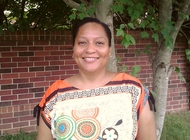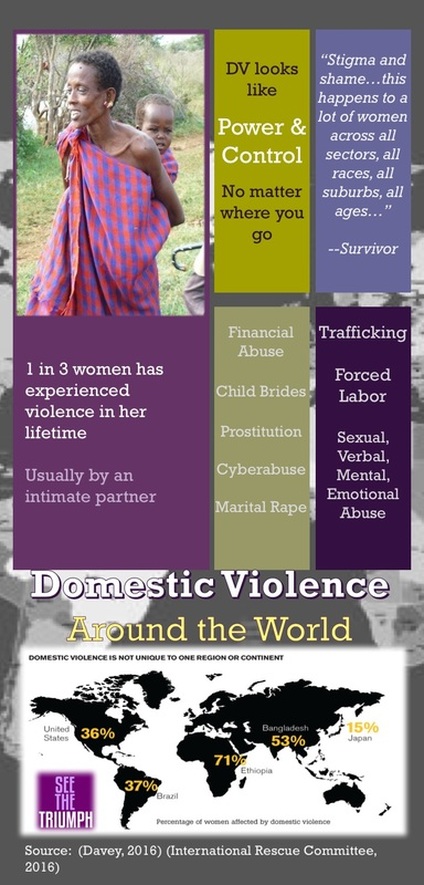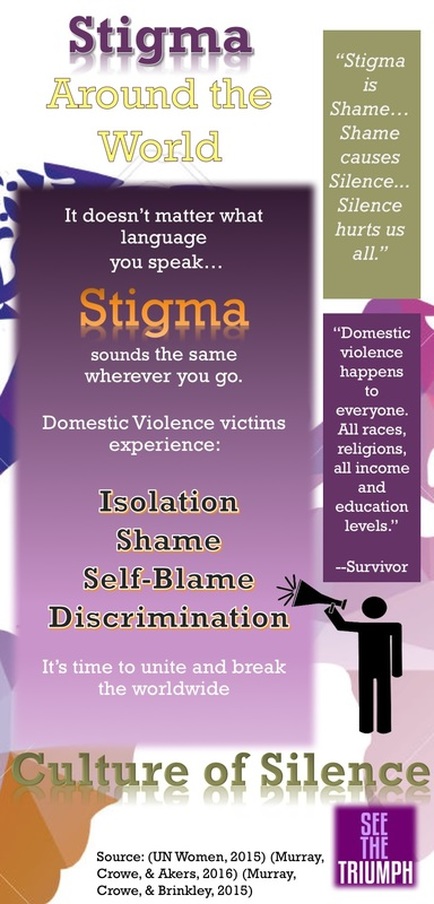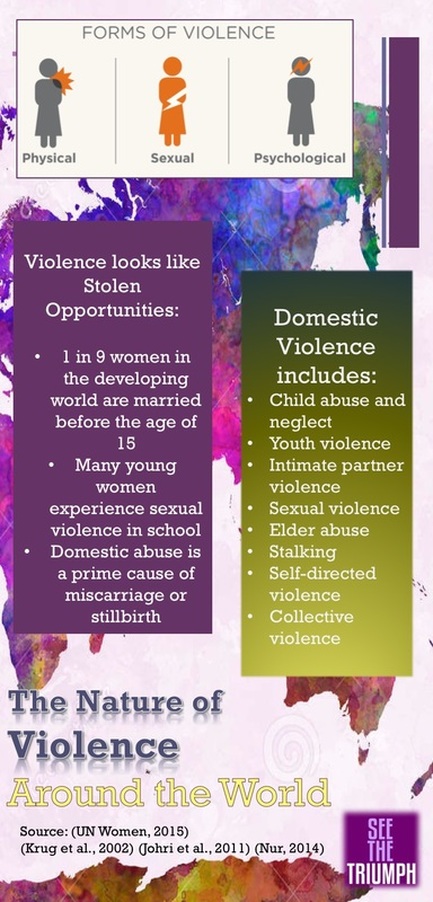|
9/29/2016 Together In TriumphBy Jessica, See the Triumph Contributor
Moving through different countries during my twenties, I was consistently drawn to groups of women that had a community strength about them - the ones where you are welcomed in as a daughter or a sister, called “my dear” in the mother tongue, and taught to make the traditional family meal. My eyes were also drawn to the subtle signs of injustices occurring towards women in these cities, towns, and villages. Whether it was remnants of forced sex work, the whispers of familial violence, or the shadows of sexual abuse, the traces of women’s stories and their survival were there. These issues flew under the radar, quashed by cultural traditions, deep-seated gender imbalances, and biased solutions. As a survivor, I am accustomed to violence against women being interpreted as an uncomfortable topic. If a story comes up, the breath is taken out of the conversation. In media, favor is given to the abuser while we pick away at the survivor’s story, accusing them of everything but being a victim. As a world citizen, I am bombarded by tales of pain and sadness and at the end of each day, it can often seem the world is hopeless, that there is no way to help, and we see anything but triumph. But if there is anything I’ve learned from the women I’ve met and the stories I’ve heard, it’s that triumph is everywhere - and it is a beautiful thing to behold. Triumph might resound like an echo between two mountains, or be quiet like the flutter of butterflies’ wings among the garden flowers. Triumph grows in kitchens with lovingly-made meals that carry with them a long legacy of women healing and surviving with each other. Triumph flourishes on the living room floor, connecting and laughing together with knees folded on bright cushions, and sparks during intimate conversations with a friend who says “I believe you” and takes your hand. Triumph is in the satisfaction of doing something she wasn't allowed to and no longer feeling the anxiety and shame. Triumph is the justice found in custody battles and the journalist who gets it right. We see triumph alive on the Internet with community forums and in comments and posts on Facebook, Instagram, and Twitter, where girls and women of all nationalities find their common threads and rally together. Behind closed doors around the globe are girls and women of lioness strength, steadfastly navigating what it means to survive and triumph over violence; seeing the triumph is happening every day and everywhere in communities of women, big and small, that band together and say “no more” for each other. Triumph is survivors taking on the world in their own way, as it means to them, surrounded by a global community that understands and sees the triumph with her. No matter who we are, we can choose to see no hope, or we too can choose to see the triumph. By Sara Forcella, See the Triumph Contributor
October is always an advocacy-charged time of the year. With it being both Breast Cancer Awareness Month and Domestic Violence Awareness Month, there is a fair share of advocacy and activist work being done. October’s a month where splashes of pink and purple can be seen all over your community. It’s a time where we celebrate women that we love and health concerns that we hope to change. But here’s the problem: Talking about any issue for only a month won’t really change the issue. Talking about domestic violence for one month a year is not going to even put a dent in the issue. Discussing physical, emotional, financial and sexual abuse one month per year will not help the estimated 42.4 million women in the United States who have experienced rape, physical violence, and/or stalking by an intimate partner in their lifetime (NCADV).* It’s not enough for the woman who blames herself to cope with the abuse she faces at home. It's not enough for the man who is ashamed to call the police after being beaten by his partner for fear that he will be stigmatized. It is not enough for the teen who identifies ‘red flags’ within her relationship, yet is unable to realize that these may lead to abuse. I can assure you that even hearing about domestic violence for 21 years was not enough for my 21-year-old self when I witnessed the brutal bruises that my best friend would receive from her partner. It’s my stance that history has proven that talking about domestic violence for only a month has yet to improve the state of violence against women. Domestic Violence Awareness Month was first observed 1987, yet nearly 30 years later the rates of both women and men dealing with this issue are not only alarming, but downright terrifying. Raising awareness is a great start to the work that remains to be done, but it isn’t something that is going to trigger a cultural change. Abusers do not just stop committing violent acts after October 31st; yet, for some reason the national outcry of support and understanding does. Don’t get me wrong, I love the fact that, for one month a year, folks are emotionally charged about domestic violence. It excites me--it gives me hope. Nonetheless, my work as an advocate doesn’t end when DVAM ends, nor should our nation’s focus on this issue. But that’s just it--We as a society often are only focusing on the problem for one month a year. Domestic violence affects each and every member of our nation, every day, regardless of if people identify as a victim or not. Domestic violence affects our children’s educations, our communities, our economy and, more importantly, it’s affecting people we know--our friends, family, and colleagues. An incredible aspect of domestic violence is that it’s 100% preventable. This means that we need to dedicate time, money, energy and heart way more than just in October to end this public health epidemic. As we begin to prepare to promote DVAM, I ask you to speak up, join the cause, paint your hair purple, volunteer at a local shelter, donate food or clothing to local DV agencies--Do all you can do to support the cause. DVAM is an important time of year, but remember it’s just the opening segment of a conversation that needs to be had all the time. *Reference: National Coalition Against Domestic Violence: http://www.ncadv.org/ By Angiemil Pérez Peña, See the Triumph Guest Blogger Walking into the local shelter for someone experiencing domestic violence can be hard. Reaching out for help to the local community agency or navigating the local resources can be overwhelming for a local resident, but how much more daunting is it to navigate for an immigrant women? When seeking help for an abusive relationship, many immigrants experience increased difficulties and additional barriers for individuals in this group to exit their abusive relationship. The existing research tells us that documented immigrants, and even moreso for undocumented immigrants, are much less likely to report domestic violence to the police, compared to their non-immigrant counterparts.(1) Some of the barriers that immigrants experience when they do reach out for help include lack of fluency or speaking the dominant language, immigration status, financial dependency on their partners, lack of knowledge about their legal rights, not desiring to perpetuate negative stereotypes of their culture, and the lack of existing culturally appropriate services. Additionally, abusers may exploit these vulnerabilities to keep the victim in the relationships. When you consider the threats immigrant victims may receive--such as the abuser keeping their legal documents, threatening to call immigration and take away the children, refusing to file immigration papers, and denying access to legal documents, to name a few--you begin to understand the added difficulty for immigrant women leaving domestic violence. Changing the accessibility of resources for immigrant victims of domestic violence will take the involvement of the entire community. We need to continue to reinforce the idea that domestic violence is a social problem, and we all have to take part of the solution. This includes educating members and leaders of vulnerable communities to think of more social justice solutions. If you’re in a position to help an immigrant who is experiencing an abusive relationship, consider the following suggestions. First, help the person to consider ways to promote their safety, whether or not they leave the relationship. Second, think of the cultural strengths that individuals belonging to collectivistic culture may have, such as social support and having support family members that could help to protect them from an abuser. Third, educate yourself on specific resources available regarding immigration, protective laws such as VAWA, and additional local community resources. Fourth, make every effort to provide services in the native language or work with interpreters who are trained to understand domestic violence. Lastly, strive toward becoming culturally responsive to the needs of underserved populations. Working together, we can foster communities that offer support and safety for immigrant survivors of domestic violence. Reference: 1: Sokoloff, N. J. (2008). Expanding the intersectional paradigm to better understand domestic violence in immigrant communities. Critical Criminology: The Official Journal of the Asc Division on Critical Criminology and the Acjs Section on Critical Criminology, 16, 4, 229-255.  Angiemil Pérez Peña is a graduate student at The University of North Carolina at Greensboro studying Couple & Family counseling. By Michelle Vann Horton, See the Triumph Guest Blogger
Places of worship are often viewed as safe havens, a refuge for those in need. This perception has been no different for many immigrant victims who suffer from intimate partner violence. Many times, immigrants reach out to their religious leaders first before seeking professional sources of support. This sounds like a good idea, since religious institutions play a vital role in helping immigrants maintain their cultural identity and stay connected to others. Can we assume that religious leaders who shares a similar cultural background would be empathetic to immigrant victims of intimate partner violence? Unfortunately, in many cases, this is not what happens. In reality, many religious leaders react negatively or are unsupportive to victims of abuse. There are many reasons this may happen. First, many religions promote a harmful patriarchal point of view, which promotes male domination over women. From this lens, gender norms are established where sexual inequality is accepted and upheld in families throughout generations. Second, group-oriented cultural ideologies often prioritize the advancement of the community, family unit, or marriage over the wellbeing of the self. In addition, cultural definition and perceptions of intimate partner violence can vary greatly, and in many immigrant communities, these issues are not even acknowledged. Together, these cultural views can contribute to the negative reactions religious leaders may project as they silence victims or blame the victims’ behavior as cause for the violence (i.e., victim-blaming). Leaders may relay the message that it is the victims’ responsibility to stop the violence and imply that victims’ abuse results from their failing in their relationship with God. It is important for immigrant victims of family violence to surround themselves with multiple sources of support, especially people and organizations that have expertise with helping people impacted by violence and abuse. I know this may be easier said than done, especially with the overwhelming barriers immigrant populations face daily, like language barriers, discrimination, adjusting to mainstream culture, and lacking knowledge about U.S. laws and available support systems. Due to these barriers, it is vital that community agencies have the training and the staff needed to meet the culture-specific needs of the growing immigrant population in the U.S. Moreover, it is imperative that domestic violence agencies also connect with religious institutions and leaders that serve immigrant communities in order to become more proactive in removing the stigma associated with family violence, especially within places of worship. As agencies partner with religious institutions, religious leaders can increase their competence in supporting victims and survivors, as well as create community norms that promote safe relationships and families. In addition, prevention and educational programs can be implemented that honor and respect cultural norms while reframing the ideals of what a healthy marriage and family looks like. Ultimately, religious leaders have the power to confront controversial issues like family violence in their preaching and in their teachings. The ability to take a stand against family violence while at the pulpit sends a direct message to congregants that promotes survivors’ safety and holds abusers accountable. By HM Humphrey, See the Triumph Guest Blogger  H.M. Humphrey recently graduated from UNCG with a masters in Counseling. She is passionate about working with couples and families, and feels the importance of engagement and advocacy for the promotion of social justice in the community. References
By Allison Crowe, See the Triumph Co-Founder
This month, we are focusing on “Seeing Triumph Around the World” and spotlighting some of our very important international ambassadors who make up our newest See the Triumph initiative, the International Ambassadors Program. We will pay special attention to international issues this month because we firmly believe that violence is a global issue, and that learning from each other will only help all of us as we work together to end domestic and intimate partner violence around the world. According to the World Health Organization, 1 in 3 women worldwide have experienced some form of intimate partner violence. This statistic is upsetting. We also know that the stigma that surrounds intimate violence in so many cultures is a large part of why these numbers are so high. Stigma because some believe that domestic violence is something that occurs “behind closed doors.” Or stigma because a victim believes that she or he somehow deserved to be abused. Or stigma because a victim feels embarrassed or ashamed that he or she did not leave the relationship sooner. Given these sorts of facts and complexities, how do we maintain the belief that we can work together to end the stigma of intimate partner violence? The answer is, through you. All of you out there have a story to tell. A story about how you struggled. A story of how you still might be struggling. A story of how you made it out alive, or how you have since helped someone else. The way we can continue to overcome intimate partner violence, and stamp out the stigma that surrounds it is by hearing from you. We encourage you to tell us your story. We have heard from nearly 500 of you who have wanted to share your story – we invite anyone else who wants to participate to do so here: http://www.seethetriumph.org/participate-in-our-research.html Help us continue to talk about not only surviving but triumphing over intimate partner violence and the stigma that surrounds it! These are global issues, and this month, we want to hear from all of you. Remember, it’s you who can make the difference for someone else – in your own community or around the world By Christine Murray, See the Triumph Co-Founder
The Rio Olympics recently brought the world together around athletics, and global awareness always peaks around Olympics seasons. But what about at other times? When we don’t have daily reminders about the connections between our own communities and the rest of the world, how much time do we spend reflecting on how are local communities are interlinked with others in countries across the world? This month, we’re doing a special theme for See the Triumph to highlight international issues related to the stigma surrounding intimate partner violence. Of course, we won’t have the opportunity to address every single nation and culture around the world. However, we hope that throughout the month, we’ll encourage members of our community to consider how understanding international issues can change our thinking about intimate partner violence, culture, and the experiences of survivors. In the beginning of 2016, we launched our See the Triumph International Ambassadors Program. We were thrilled to partner with Ambassadors from a diverse group of countries who are working with us to help expand our See the Triumph to end the stigma surrounding intimate partner violence and develop supportive resources for survivors around the world. You’ll hear from several of our Ambassadors this month and learn about their unique perspectives on intimate partner violence in their countries. At See the Triumph, we believe in the “Think Globally, Act Locally” approach. The truth is what happens around the world, in communities far away from our own, impacts us. This is true more today than ever, with global migration patterns changing all the time. For this reason, we’ll also address immigration issues this month as part of this series. Immigrants often face added levels of complexity and stigma when they seek help if they are being abused in a relationship, and it’s important that we consider ways to make community services and resources more accessible to immigrant survivors. Beyond immigration issues, intimate partner violence that happens across the world affects us for the very important reason that safe, healthy relationships are a basic human right. As Martin Luther King, Jr. said, “Injustice anywhere is a threat to justice everywhere.” It’s important we work toward ending violence in our own communities, but we can’t rest until everyone, everywhere, is free from violence and oppression. We hope you’ll join us in this journey to explore stigma, intimate partner violence, and stigma around the world. Throughout the month, please share your comments and your own experiences to help move this dialogue forward! 4/12/2016 A Letter to SurvivorsBy: Sara Forcella, See the Triumph Contributor
For all those times I have not quite been able to find the words to say, and all of the times that I didn’t speak up when I should have. For all of the words that were never uttered from my lips--I choose to say them now. Dear Survivor, I believe you. I believe your experience to be true. I believe all of the hurt, fear, shame and pain you have experienced. I believe you even if you have no physical bruises, photos, or evidence. Even if the police disregard your story, or probe you with more and more questions; I believe you. Even if your assailant was not held accountable by your school or never sees a day in jail, I know you are telling the truth. Even if your friends, peers or teachers don’t believe. Even if you are questioning each and every detail, every possible ‘missed-step’, every word, answer, fuzzy, discombobulated memory--I believe you. It was not your fault. Abuse is NEVER okay. Regardless of whether it’s physical, emotional or sexual, abuse is abuse. Nothing ever justifies that person’s actions; not what you were wearing, who you were texting, what you said, who you were with, what you drank, what you chose to do or not do. The only person who is ever responsible for abuse is an abuser. I know right now it may feel like it’s your fault; that person may have told you that their abuse was your fault. Heck, society has likely told you this too. It’s not. Let me repeat that--that person's actions were not your fault, and they will never be. You will be okay again. Maybe not right now, not tomorrow, or next week. In this moment, you may feel like a mirror, shattered on the floor in a million pieces--a mess that seems too much to ever put back together. You are likely overwhelmed, scared, confused, hurt, mad, and upset. Allow yourself to be, you have the right to experience all of these emotions. The multitude of emotions will likely ebb and flow for awhile. In time these emotions may seem less intense. One day, you may find power where you once felt weakness. You may find a voice where it seemed to have been stolen from you. This experience will likely shape your life. It’s not something you just forget but, it does not mean that you are broken forever, just that you are a survivor. You are beautiful. You are breathtakingly beautiful. I am not just talking about your physical appearance, but your being. Your being is what makes you beautiful. The way that you approach life is beautiful and triumphant. Simply the fact that you wake up every day and exist is beautiful. With or without scars, blood shot eyes and a runny nose, you exude beauty. Currently, you can’t see this beauty, only the hurt sunken face looking back at you. Nevertheless, I see it. I see your beauty shining through the pupils of your eyes like a ray of sunshine, a small glint of hope. One day, I hope you see this beauty too. You deserve love. You deserve to be loved by family, friends, romantic partners when you are ready, and most critically yourself. You are not damaged goods because someone chose to infringe upon your power and control. You are not unlovable. In fact, I believe that you deserve the most pure and authentic kind of love--self-love. You deserve to bathe yourself in loving words, compliments and good feelings because you are so worth it. You deserve loving, healthy relationships with every person who is in your life. Please don’t accept anything less. You are strong; stronger than damn near everyone that I know. Stronger than I am, I’m merely here to support you. You are the one doing all the work--the one being vulnerable, bearing all of your hurt. I admire your strength. I admire your ability to get up every day, sometimes in spite of yourself. I see this incredible strength, it’s there behind your sunken eyes. Someday when you look back on this I hope that you see just how strong you are. I’m sorry that you have to use up so much of your strength right now. It’s not fair; there you are, nonetheless, a mountain holding strong in the face of an unforgiving wind. You inspire me: inspire me to get up, to get dressed, to go to work, to fight, to exist, to love. Thank you. 3/29/2016 Don't Confuse My Anonymity for ShameBy Anonymous Survivor
I’m writing this anonymously, so you have no idea who I am. I wish that I could tell you who I am. I wish that I could speak openly about my experiences with abuse. I’m proud of what I’ve overcome and all that I’ve learned from those experiences. I wish that I could stand openly in solidarity with the many courageous other survivors who do speak publicly about their experiences. Oh, how I wish that I could finally tell my story out loud for all who are interested to hear. But, I can’t be open about my story and my identity as a survivor. It has nothing to do with shame. At times in the past, I admit that I was ashamed to have “gotten myself into” an abusive relationship. When I was first grappling with my experiences of abuse, I was embarrassed that I had been abused. Fortunately, it didn’t take me long to realize that I didn’t need to feel any shame about those experiences. Instead, my abuser is the one who should carry all of the shame for what he did to me. Today, I don’t carry any shame about being a survivor of an abusive relationship. I’m proud of myself because I walked away from that relationship and because I’ve worked really hard to become a better version of myself since then. As much as I wish that I could be open about being a survivor of abuse, I simply can’t do it. The truth is that it’s not safe to do so. My former abuser still has it out for me. If I were to speak publicly about what he did to me, it would almost certainly set him off, and this wouldn’t be safe for me and other people who I care about. As much as I want to be able to publicly share my story, I just can’t risk the danger it could create if I do so. And so, I’m an “anonymous survivor,” and only a handful of people who are close to me know the full extent of what I went through. Because of this, I know that there are many other people out there who are just like me. There are many other people who are survivors of past abuse who’ve never told others or spoken publicly about abuse they faced. We all need to remember this: Many people who we meet every day have faced abuse and other traumas in their lives, but for one reason or another, they keep those experiences private. And, it’s their right to do so. Being open and public about being a survivor does give people more opportunities to help others by sharing their stories and by being a role model to other survivors. However, being public about one’s story of abuse isn’t a requirement for successfully recovering from abuse. Let’s continue to work toward a world that provides more support and validation to all survivors of abuse - whether we know who they are, or not. By Christine Murray, See the Triumph Co-Founder
The stigma surrounding intimate partner violence is complex and comes from many sources. In one of our most recent research studies, we looked at the different sources of stigma, as well as the different components of stigma that victims and survivors often face. The sources we identified included the perpetrator, other people (e.g., friends, family members, and professionals), internalized stigma by the person himself or herself, and society. One of the ways that society perpetuates stigma against victims and survivors of intimate partner violence is through the media. One of the best ways to understand how the media stigmatizes people who have experienced intimate partner violence is by hearing how those media messages impact survivors. Today, we wanted to share reflections from a survivor who participated in our research on how the media perpetuates the stigma that surrounds abusive relationships. This survivor—who faced very severe violence at the hands of a former boyfriend but managed to safely leave that relationship several years ago—shared that she believes that the media perpetuates inaccurate stereotypes about abuse. She said, “I think with newspaper and, or newspaper media, news media, and the movies, and again depending on what movie and that kind of thing …there’s kind of a strange idea that there’s something, that the reason that people stay in abusive relationships is because there’s something interesting about it or that it’s somehow, that they somehow want that, which is weird…I guess that maybe it comes from not knowing why, like ‘Why would somebody stay? Well, they must be getting something out of it,’ kind of thing. I don’t know if that’s where it comes from, but it seems like movies in particular seem to show women as kind of sending mixed messages about what’s okay or not okay. And that seems dangerous, in that it’s perpetuating this idea that what a person says isn’t really what they mean, and that sort of thing. And certainly, and I think, in terms of news media, people are often presented in a way that seems that women who are abused by a husband, or whatever, are fundamentally weak somehow. That there’s this kind of weakness, like an overwhelming weakness of not being able to cope with the world, or not being able to handle stress, or not being able to properly care for their children, or that sort of thing. That it comes down to a lack of strength or something like that, which also seems peculiar and dangerous in placing all of the onus on the woman in that way, which is curious and of course misguided.” To really end the stigma around IPV, this survivor believes that these media messages need to change. She said, “I feel like books do that often, too. They make the abusers out to be monsters and they make the women, typically women, who are being abused as kind of weak and not real thinking. And I understand that, of course, we don’t want to be portraying the abusers as sensitive, thoughtful, insightful people. That wouldn’t be right, too. But at the same time there’s a lack of complexity or a lack of, like, fullness. Like, it’s not just that the person hits you, but doesn’t hit you every time you see him, like in every waking moment. There are other things, too, that make it, that add up to this whole, of being just confusing and, not being able to do necessarily what you know is the right thing to do.” To challenge the stigma that surrounds intimate partner violence in society, it’s important that we learn to think critically about the messages that are conveyed in the media about abusive relationships. In addition, we need to listen to the wisdom of survivors to learn more about how these messages impact them and their willingness to seek help and share their stories with others. Let’s keep working together to end the stigma surrounding intimate partner violence so that we can erase the barriers that this stigma creates! |
Archives
July 2024
CategoriesAll About Intimate Partner Violence About Intimate Partner Violence Advocacy Ambassadors Children Churches College Campuses Cultural Issues Domestic Violence Awareness Month Financial Recovery How To Help A Friend Human Rights Human-rights Immigrants International Media Overcoming Past Abuse Overcoming-past-abuse Parenting Prevention Resources For Survivors Safe Relationships Following Abuse Schools Selfcare Self-care Sexual Assault Sexuality Social Justice Social-justice Stigma Supporting Survivors Survivor Quotes Survivor-quotes Survivor Stories Teen Dating Violence Trafficking Transformative-approaches |
Search by typing & pressing enter











 RSS Feed
RSS Feed